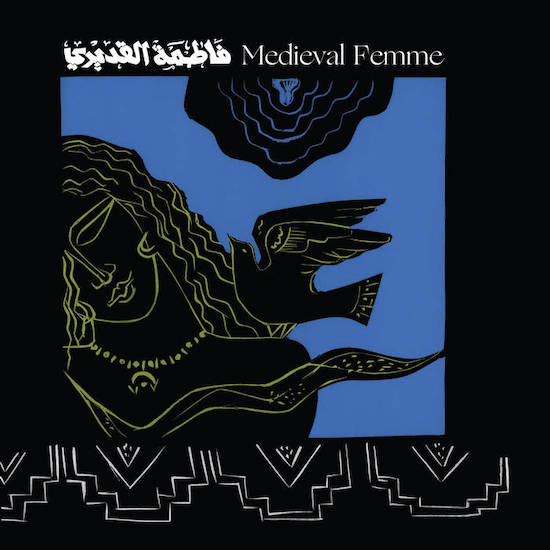It feels a touch wrong to call Medieval Femme an album, per se – not only do modern releases vary wildly from the forty-minute limit of the LP, but they also have singles and album cuts. This is rather a suite, a collection of pieces reflecting on a similar theme, in this case “the state of melancholic longing exemplified by the poetry of Arab women from the medieval period”. Fatima Al Qadiri’s approach to songwriting bears some similarities to classical form (exposition, development, recapitulation) – and very little to pop structures.
Firstly, the songs are slow on the whole, with maybe two melodies per cut – and largely lack percussion too, though ‘Sheba’ tantalizes briefly with some brisk kick hits halfway through. The vocals linger on their diction, each syllable ringing long over the mix, like inhalations with weight. Al Qadiri’s third record meddles with our sense of history, mightily impinging the past and future onto the present, such that we have no choice but to acknowledge our temporality. Only through the record’s passing does the tension between immediate present and distant past or future resolve.
Despite such a minimal aesthetic the lasting structural impression is (ironically) similar to a classic, rockist concept album, ELP’s Pictures at an Exhibition. We alight upon an artefact of stunning beauty, gaze for a brief moment during which time abandons consciousness, before the museum audio guide equivalent (tracklist) nudges us onto the next exhibit. This belies the haunting tonal qualities of the suite; with so much reverb on every layer, sounds don’t so much outstay their welcome as set up shop, trickles of water slowly filling a deep well. Relying heavily on traditional Middle Eastern instrumentation for the majority of the record’s melodies, set against sequenced chords with no apparent attack to speak of, there is an echo of austerity in this juxtaposition. A great collapsing of power and tradition, leaving monuments in its wake to be revived and held at a distance by the omnivorous culture machine, much in the same way Coil referred to Roman imagery on Horse Rotorvator. In this way, although Al Qadiri has delved deeply into the past and returned with fantastic source material (penultimate cut ‘Tasakuba’ being an especially potent example), the album is somewhat elegiac; it mourns as it revives.
However, my quick and dirty summary for this record would be extending ‘Come Down to Us’ by Burial into a whole album – and that’s a compliment of the highest order. This is borne out through several aspects: the bass most often used as a drone, filling up the seeming acres of space implied by the reverb-doused melodies; a powerful sense of warmth accompanied almost instantaneously by a tickling nervousness; diminished scales from plucked strings represent the alterity and perceived structure of antiquity while ambiguous pads and murmurs perhaps indicate the uncertainty of the future. The fact that the album is released on Hyperdub (Al Qadiri’s last for the label) should of course not be overlooked given these associations.
Medieval Femme plays to its strengths, with only a couple of disjointed cuts amongst an excellent collection, and even those keeping a tight ship on runtime. My deepest concern is that the record may be too well suited to being featured in art galleries and the like – it’s small and perfectly formed, un-intrusive and airy, graceful and conceptual. However, its moments of stark contrast and discomfort should keep it from becoming too much a piece of design fiction, a critical darling, which would diminish that very ‘desolation’ Al Qadiri intends to invoke (alongside the ‘reverie’). For Hyperdub fans, or just fans of hearing the same sound continue indefinitely, this record will be an essential addition.



